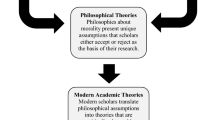Abstract
The authors analyze results of a survey of members of the Columbia University Graduate School of Business classes of 1953–1987 in order to assess the potential effectiveness of firms' ethics training programs. Results suggest that such training has a positive effect, but that relatively few firms provide such programs (about one-third of the respondents worked for firms with such programs). Although the sample is not representative of American employees and managers generally, the results suggest that it may be worthwhile for firms to provide formal ethics training to their employees.
Similar content being viewed by others
References
Collins, D.: 1989, ‘Organizational Harm, Legal Condemnation and Stakeholder Retaliation: A Typology, Research Agenda and Application’,Journal of Business Ethics 8, 1–13.
Cullen, J. B., B. Victor and C. Stephens: 1989, ‘An Ethical Weather Report: Assessing the Organization's Ethical Climate’,Organizational Dynamics 18(2), 50–62.
Etzioni, A.: 1989, ‘Money, Power, and Fame,’Newsweek (September 18), p. 10.
Genfan, H.: 1987, ‘Formalizing Business Ethics’,Training and Development Journal (November), pp. 35–37.
Gordon, J.: 1990, ‘Where the Training Goes’,Training, October, 51–69.
Hager, B.: September 23, 1991, ‘What's Behind Business’ Sudden Fervor for Ethics?’,Business Week, 65.
Kahn, W. A.: 1990, ‘Toward an Agenda for Business Ethics Research’,Academy of Management Review 15, 311–328.
Kelley, S. W., S. J. Skinner and O. C. Ferrell: 1989, ‘Opportunistic Behavior in Marketing Research Organizations’,Journal of Business Research 18, 327–340.
Kohlberg, L.: 1981,Essays in Moral Development: The Philosophy of Moral Development (Vol. 1), New York: Harper and Row.
Kohlberg, L.: 1984,Essays in Moral Development: The Psychology of Moral Development (Vol. 2), New York: Harper and Row.
Laczniak, G.: 1983, ‘Business Ethics: A Manager's Primer’,Business, January–February–March, 23–29.
Lee, C.: 1991, ‘Who Gets Trained in What?’Training, October, 47–58.
Levin, M.: 1989, ‘Ethics Courses: Useless’,New York Times (November 25).
Nelson, R. F.: 1990, ‘Training on Ethics’, paper presented at The Conference Board 1990 Business Ethics Conference.
Shriver, D. W. and J. W. Kuhn: 1987, ‘Can Ethics Be Taught in Graduate School?’ unpublished manuscript.
Stanga, K. G. and R. A. Turpen: 1991, ‘Ethical Judgments on Selected Accounting Issues: An Empirical Study’,Journal of Business Ethics 10, 739–747.
Thompson, B. L.: 1990, ‘Ethics Training Enters the Real World’,Training (October), pp. 82–94.
Trevino, L. K. and S. A. Youngblood: 1990, ‘Bad Apples in Bad Barrels: A Causal Analysis of Ethical Decision-Making Behavior’,Journal of Applied Psychology 75, 378–385.
Victor, B. and J. B. Cullen: 1988, ‘The Organizational Bases of Ethical Work Climates’,Administrative Science Quarterly 33, 101–125.
Vitell, S. J. and D. L. Davis: 1990, ‘The Relationship Between Ethics and Job Satisfaction: An Empirical Investigation’,Journal of Business Ethics 9, 489–494.
Weber, J.: 1990a, ‘Managers' Moral Reasoning: Assessing Their Responses to Three Moral Dilemmas’,Human Relations 43, 687–702.
Weber, J.: 1990b, ‘Measuring the Impact of Teaching Ethics to Future Managers: A Review, Assessment, and Recommendations’,Journal of Business Ethics 9, 183–190.
Author information
Authors and Affiliations
Additional information
John Delaney is Associate Professor of Management and Organizations at The University of Iowa. His research on ethics in business has been published in Across the Board and Iowa Business. As part of an ongoing study, he is collecting examples of ethical dilemmas that have been confronted by managers in recent years.
Donna Sockell is Director of Credit Programs and Professor of Management and Labor Relations at Rutgers, the State University of New Jersey. In addition to her research on ethics in the workplace, she has designed and taught ethics programs for several corporations and commodities exchanges. Currently, she is gathering information on how firms' ethical practices affect employees.
Rights and permissions
About this article
Cite this article
Delaney, J.T., Sockell, D. Do company ethics training programs make a difference? An empirical analysis. J Bus Ethics 11, 719–727 (1992). https://doi.org/10.1007/BF01686353
Issue Date:
DOI: https://doi.org/10.1007/BF01686353




